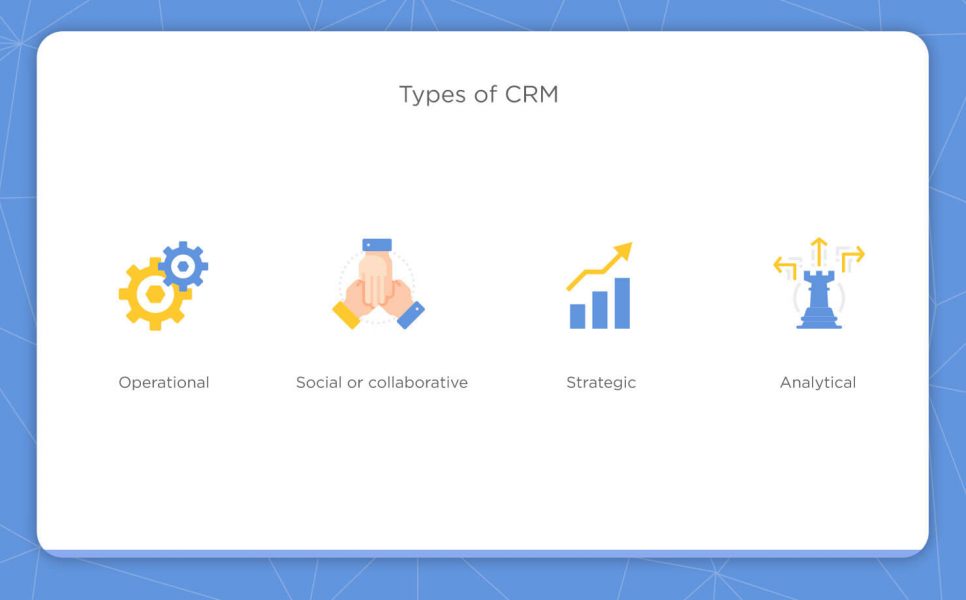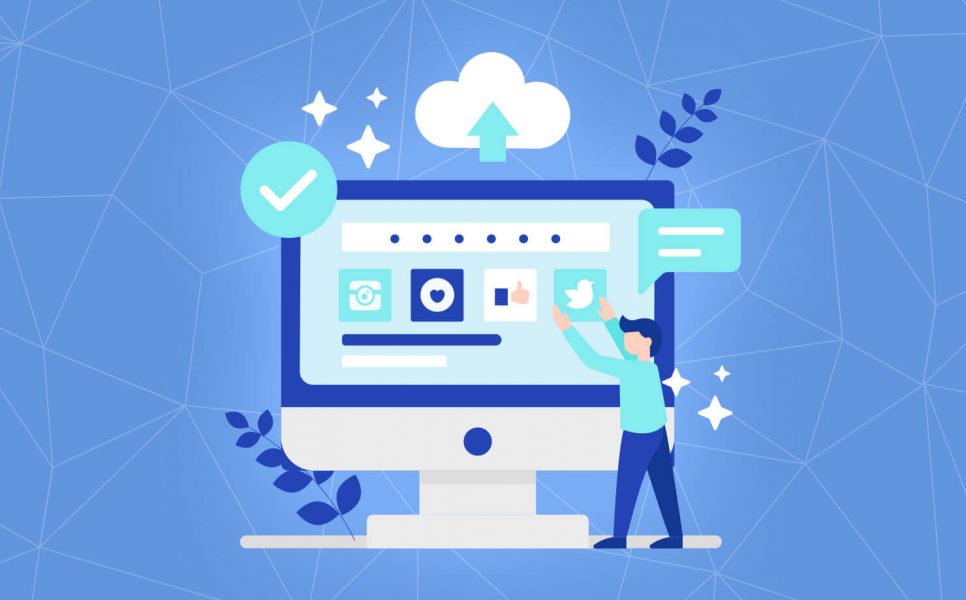As of today, in order to have a competitive ability, it is a must (not an option) for any type of business to provide the goods and services of only the highest quality. The customers are getting used to that and the business owners are often required to also provide the high-quality support and make the overall process of purchase as much accessible and pleasant as possible. For that matter, the separate software development niche was created – CRM (Customer Relationship Management). Integration with such software allows systemizing and automating many processes of interaction between the companies and their customers.
There are four general types of CRM(each according to its primary function): strategic, collaborative, operational, and analytical. This article will help you figure out which functionality features each type of CRM systems has.
Let's review main pros and cons of ERP vs. CRM to make the right choice which software your business needs.
Types of CRM software: what types are there and what they can be used for
Below, we will review the four mentioned above types of CRM software in more details and discuss some features individual to each type.
Strategic CRM
The companies that apply this type of a system in practice lead the very flexible marketing strategy. They constantly change their products’ requirements in accordance with both the latest market trends and quite distinctive user groups. In fact, such type of CRM is focused on the cooperation with large clients, each of whom is capable of bringing your business a significant profit without the need to boost the business’ performance too much. In such a case, the client is not considered as a collective notion. Each potential client is met with an individual approach which would provide for them the precise understanding of how exactly your product or service will help them solve important tasks.
That is exactly why this system features the thoroughly worked out functions that collect, sort and apply all critically important client data in practice. Using the strategic CRM, you can focus on the real people’s requirements in order to create the solution that would fit their consumer interests in the best way.
Collaborative CRM
As indicated by its title, the Collaborative CRM provides the most productive interaction between several business establishments at once in order to create an utterly efficient strategy of the product / service promotion and presentation to potential clients. That does not mean, however, that the Collaborative CRM cannot be used within a single organization. In particular, they can offer a set of tools applicable in providing communication support between your business’ separate departments (between marketing and sales departments, for instance).
Not only traditional communication tools like telephones, faxes, and mail are used for that matter. There are also more complex from the developer’s perspective approaches which imply the IP telephony as well as themed forums and the in-house chats constricted by the local network. Such CRM will be the irreplaceable assistant in B2B scripts implementation. The most popular Collaborative CRMs are Sugar CRM, SAP 360 Customer, Microsoft Dynamics CRM and Sage CRM.
Operational CRM
Being one of the most popular types of CRM software, Operational CRM features the most complex functionality structure among the variations of the similar software. Their activity is utterly focused on customers and the direct interaction with them. All the functions featured in the operational CRM are subdivided into three large categories: sales force automation, marketing automation, and support automation. Let us review each in more details.
Sales force automation. SFA includes the customer contacts tracking system and the system that detects new potential customers. SFA is easily integrated with the CRM and can even serve as a base for that system. The SFA’s functionality is subdivided into several separate modules:
- Creation of the product’s configuration (a customer can choose the optimal product build or service package to define its end price – for example, many automotive company owners offer software services which allow constructing the vehicle configuration online);
- Transactions management (such functionality allows to systematize all the data related to payments (conducted both via bank cards and with cash));
- Sellers and customers management (this category’s functionality is able to single-handedly distribute the customers between the sellers. It also provides the sellers with info on how to keep the customer engaged and motivate them for further cooperation);
- Contact data management (sales managers create electronic catalogs with sorted customer data via such applications).
Marketing automation. Marketing automation is a complex of software solutions that connect the marketing data to the data received during sales. Based on that, they generate the information beneficial to further business activity (particularly, to development of new products, promo campaigns, loyalty programs, etc.). For instance, suppose, you are the owner of the mobile telecommunications company and you got a call from a customer with certain requirements as to a tariff – the CRM takes all the information into account and offers the optimal solution (tariff) to meet all their requirements.
Support automation. Support automation is, essentially, an ordinary tech support brought to an automated level. It is a very important part of your business if the daily customer circulation is comprised of not hundreds but thousands of clients. E.g. if your customer has problems while choosing the potential or applying the already-bought product, the special functionality of the operational CRM redirects them to the proper expert,applies a chatbot or an interactive voice response system (IVR).
If you decided to implement the operational CRM inside your business, we recommend checking out such solutions as Salesforce (for large business establishments) and Zoho (for startups and small businesses).
Analytical CRM
The activity of all the previous CRM software types is focused primarily on providing the means of all-around interaction with the customers. In its turn, the main strategy of this type of CRM lies in collection and analysis of the marketing data which can help your business acquire new target audiences and strengthen the positions of the old ones. The activity, in this case, is not directly related to the customer support. The analytical CRM tries to motivate a customer who came across your product or service to become engaged with it on their own having evaluated all the advantages of the purchase.
Do you sell carbonated beverages? Excellent, this kind of software offers you a set of advanced tools for collection and analysis of such marketing data as the number of pops sold. Based on that, consumers selection defined by the demographics, residence, gender and other strategically important parameters is made. As a result, you will be able to develop various approaches to your business presentation in accordance with the precisely delineated consumer audience.
Moreover, such CRMs feature the software implementation for current sales and present finances management (i.e. sales level evaluation, invested resources capacity, sales rate of a certain product, etc.) and marketing data gathering (what reviews the real customers gave to your product, what benefit can a customer get from your exact product, etc.). One of the most used and advanced analytical CRMs is a Base CRM app.
Types of CRM software: conclusion As we can see, different types of CRM solutions help to cope with different business tasks. Therefore, the choice of a certain software solution is made taking into consideration the company’s format and type of the product offered. Furthermore, if you are a large business organizer you will most probably have to involve several types of CRMs at once. Only such an approach can provide the significant positive effect from their implementation.
Need a qualified team of developers?
Boost your business capacity with the dedicated development team.











